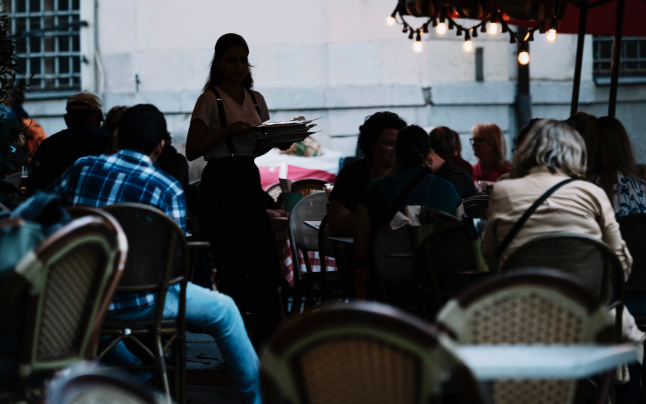Health Minister Lena Hallengren was joined by Culture Minister Amanda Lind and Public Health Agency director-general Johan Carlson at a press conference at 3pm.
“Our society is in a new, better place,” said Hallengren, pointing to the high level of vaccination against the virus in Sweden and low rate of hospital admissions. “We are taking a step towards a normal day-to-day life, a society free from restrictions.”
The limit on the number of people allowed at both public and private events will be removed along with all remaining rules that apply to restaurants and bars such as limits on visitor groups and distance between tables; previously the events and hospitality sectors were subject to strict legal limits, and could face fines if found in violation of these.
The national recommendation to work from home if possible, which was not legally binding, will also be removed, but the Public Health Agency has advised employers to implement a return to physical workplaces “gradually”.
These changes will come into effect from September 29th onwards, and are in line with what was planned for September in step four of the government’s five-step plan for easing pandemic restrictions.
“The announcements we are making today mean that vaccinated people can in principle live as normal after September 29th. For the unvaccinated, they continue to be at risk of suffering serious illness, and this will be a concern when day-to-day life returns to a more normal situation,” warned Public Health Agency General Director Johan Carlson.
The government had warned that whether or not restrictions were lifted as planned would depend on the pandemic situation, including the vaccination rate and the burden on the healthcare sector. In late August, the Public Health Agency said then was not the time to ease Sweden’s remaining restrictions and recommendations due to the increasing rate of new infections.
But there has been a lot of pressure from the culture, sports and restaurant industries to open up, or alternatively to introduce a vaccine pass for events. Sweden currently uses the EU’s digital Covid certificate for travel, but has no separate domestic rules for vaccinated and unvaccinated people unlike many other European countries. The vaccine pass is currently not available to people without a Swedish social security number, the personnummer, nor to Swedish residents who got vaccinated abroad, as The Local has reported in a series of articles.
Hallengren told The Local, when asked at the press conference, that the government had done “our very best” to create a working Covid vaccine certificate for everyone, but acknowledged that some groups were currently unable to get it. She added that the government had ordered the eHealth Agency to make sure that for example people without a personnummer can apply for the vaccine pass manually. As The Local has previously reported, the eHealth Agency must present this plan by October 1st.
Earlier on Tuesday, Stockholm authorities were putting pressure on the government to allow a 45,000-person Elton John concert to go ahead in the capital in October.
Culture Minister Amanda Lind said at the press conference that there may still be “a need for certain restrictions for the largest events”, and said that the government had ordered an inquiry into a potential domestic vaccine pass. This will not be used if the changes go ahead as planned on September 29th, but could be used for large events if the Public Health Agency recommends this and if the limits on audience numbers cannot be lifted as currently planned.
Sweden’s infection rate has been on an upward curve in recent weeks, and its 14-day incidence rate stood at 127 per 100,000 people in the last two full weeks of August.
Neighbouring Denmark, which has a higher incidence rate (225 per 100,000 people according to ECDC) but also a higher rate of vaccinations (76 percent of the Danish population has had at least one dose and 73 percent were fully vaccinated, compared to Sweden, where 68 percent has had one dose and 58 percent is fully vaccinated according to Our World In Data), dropped most of its Covid restrictions on September 1st.
After the next step of easing restrictions at the end of September, only the fifth and final step will remain. This, at a date to be confirmed, would see nearly all remaining restrictions and recommendations being lifted and would include removing recommendations to avoid crowding, to meet each other outdoors rather than indoors and to practice good hand hygiene. The only remaining recommendation would be to stay at home if you develop Covid-19 symptoms – this would then be removed “as soon as the epidemiological situation permits”.


 Please whitelist us to continue reading.
Please whitelist us to continue reading.
There is a typo in the first paragraph: “Swedish ministers announced at a press conference on Thursday that Sweden”. Today is Tuesday.
Just one thing re the Denmark/Sweden vaccination rates. It’s highly likely that when you account for immunity from infection both are on a similar level in practical terms.